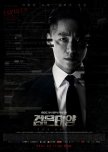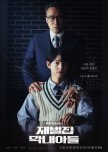
One of the best romantic comedies
I stayed up late to finish the final two episodes of this brilliant series, and I do think it's one of the best romantic comedies I've seen. However, this series is more of a romantic COMEDY than it is a ROMANTIC comedy.I love the humor of this show, because it is also referential. In Episode 11, it even hints at other recently-aired series such as My Liberation Notes ("revere me") and even alludes to Kill Me, Heal Me and many other popular K-dramas.
I have to say, it features romances that are refreshing because, again, the couples communicate well with each other. It's definitely not smooth-sailing all the time, but because they are able to converse with each other, they are able to deal with their problems well.
This is a rowdier, less sardonic Korean version of The Office, with smoldering romance at its center. The series is remarkably consistent in that even its kissing scenes are laugh-out-loud events: it's one of the few shows that feature kisses that are both hot and extremely funny at the same time.
Overall, this is definitely recommended. Intelligent, poignant, and yet boisterously funny, Gaus Electronics is one of the year's best series.
Cet avis était-il utile?

Dali and the Cocky Prince
5 personnes ont trouvé cette critique utile
A romantic comedy masterpiece
I picked this series up on a whim: I thought that the series looked quirky and its leads looked attractive. It didn't star the heavy-hitters of Korean cinema and there wasn't much noise regarding it. However, it is honestly the best series of 2021 I've seen (even better than the more popular Hometown Cha-cha-cha), and is also one of the best romantic comedies I've seen.Let's face it: we tend to like series that reflect our own sensibilities, and this series reflected many of mine. It features a business savant and intellectual boor meeting and falling for a classy, elegant, and beautiful polymath; however, she is also socially insulated and ignorant.
One of the foremost reasons why I love the series is that the characterization of the main leads was so well-written: they both are flawed individuals who grow naturally over the course of the series without losing their identities. Their mistakes that allow the plot to progress are natural consequences of their personalities, but this allows them to improve as people.
It's also extremely refreshing to see main characters communicate so well. There are many series that rely on misunderstandings and communication to propel the plot forward, but this isn't the case in Da-li and the Cocky Prince: as someone who has dabbled in psychology (and read up on it, of course), I loved how these characters broke free from Eric Berne's "games" and instead talk with true intimacy in mind. Every time there's a confrontation between the two leads - and with the people relevant in their lives - there is always the goal of understanding each other.
I also loved how the two leads could defer confronting their significant other if they're still uncertain: like any good scientist - and lover - they ascertain facts and obtain data before they confront each other. I knew that they would last long because they both were able to hold back from emotional outbursts as their love for each other grew. However, if immediate action was necessary, they also did not hesitate.
While Da-li is, to me, one of my ideal women, I greatly appreciated how Moo-hak (the male lead) was written. As an audience surrogate, Da-li herself understood that she had a keeper with her. Like Ryan Gold in Her Private Life, Moo-hak openly empowers and wishes for Da-li to succeed in what she loves and nurtures. He nevertheless retains his independence when it comes to his own expertise, but trusts that Da-li is an intelligent lady who can deal with her problems. I enjoyed seeing a male lead avoid infantilizing the lady he loves (which is why I also loved Into the Ring).
Finally, the series's writing was, to me, brilliant. All major plot points introduced are addressed by the series's end, and the series capably obeyed Chekhov's gun. Small details that are mentioned in the series are addressed over the course of the series. I especially admired how dialogue mentioned episodes prior would be recalled and applied later: it also shows the growth of feeling between the leads towards each other, because a sign of love is remembering.
It's definitely a series I'd re-watch soon (like my other favorite, My Mister). I enjoy series that feature mature and understanding couples, and this features a hallmark of one. 10/10.
Cet avis était-il utile?

Cette critique peut contenir des spoilers
Convoluted plot carried by the strength of Namgoong Min's acting
Namgoong Min transformed in order to be Han Ji-hyuk, and I have really little complaints with regard to his acting (and Kim Ji-eun was pleasant here, as well). The production and the action scenes are, like other have mentioned, excellent, but the plot remained too unfocused for it to be enjoyable.I'll try to piece together the series through my own recollection, so if there's anything to correct or address, please tell me. About one year back, Ji-hyuk Dong-wook and Kyung-sook were tasked to encourage a North Korean high-ranking official to defect to South Korea. Because this would be good for the Foreign Bureau, though, I think Commissioner Lee In-hwan tapped Baek Mo-sa (because he's the fence in NK-China transactions) to assassinate that official. There were three people in the conversation: Baek Mo-sa, Chang Chun-woo, and the NK official.
Ji-hyuk's informer (who trusted Ji-hyuk until his death) told him that someone from his agency was informing on the three, and it was between his colleagues. Kyung-seok was the informant for the Domestic Bureau/Sangmuhoe, but before he could even kill the NK official, he was already dead. Dong-wook was assigned by the Foreign Bureau Chief Do to catch the informant, because Ji-hyuk was unwilling to rat or kill his colleagues. Baek Mo-sa's plan was to attack the dignity of the NIS, which was why he trapped Ji-hyuk in the room with the NK official. Because of his quick thinking and ability, however, he was able to escape and go to their team's meeting place.
Dong-wook figures out it was Kyung-seok, and kills him, and before Chang Chun-woo could clean up the mess Dong-wook shoots at him to protect Ji-hyuk. (They were, again, compromised, and I think Chang Chun-woo was Kyung-seok's cleanup crew in case shit happened.) However, Dong-wook gets shot at by Ji-hyuk because he can't tell him that his wife had just given birth and the gun was aimed at Ji-hyuk. (I think this was the reason he was imprisoned: involuntary manslaughter gives you 3-5 years in prison.)
Ji-hyuk escapes the bloodbath and has a nervous breakdown. He taps Chief Ha, because in an operation five years ago, he caught him embezzling funds from the agency. Chief Ha brings him the memory-erasing drug ZIP, and he purges his memory but sets himself on a quest to dig out the mole within the agency.
When he returns, he can't trust anybody and struggles to unearth the leads. Although he was able to reach his previous informant, the informant was killed by Sangmuhoe (Commissioner Lee wanted to cut off ties to everyone connected with the incident of the previous year). Eventually, because Su Yeon wanted out of the Domestic Bureau's shenanigans, she was also killed. That's probably why when she was being choked by Ji-hyuk, she also didn't resist, because she was also complicit in their team's destruction.
Ji-hyuk eventually figures out that it wasn't Chang Chun-woo who wanted Su-yeon killed because he loved her, and it also wasn't Director Kang, because he was previously in a relationship with her. However (and I think this is why he was imprisoned), he joined hands with Commissioner Lee, so he aided and abetted Sangmuhoe. He broke free after her death and tried to help Ji-hyuk afterward, especially after being abducted by Commissioner Lee (with a staged suicide attempt broken apart by Ji-hyuk).
Chang Chun-woo investigated the source of Sangmuhoe, which was actually a branch of the NIS. However, before they could interrogate Chun Pyung-il (which they discovered through the QR code), he was killed by Baek Mo-sa. So why does Baek Mo-sa not kill Ji-hyuk?
This is later on explained in the final episode, where he wants Ji-hyuk to be outraged and destroy the NIS from within. However, because of Je-yi's trust (despite the fact that he had her phone tapped and all), he was able to just follow through an avoid such a disaster. I mean, Je-yi also saw how he reacted around people whom he cared for or helped him (including her when he was angrily rampaging around chasing Chang Chun-woo to save her), so she knew he wasn't a monster despite everything and trusted him.
We later discover that Commissioner Lee has a stranglehold on public information through his collaboration with Planet, one of the largest social media providers in South Korea. That was why he could have anyone killed easily.
When the two of them finally linked Commissioner Lee with Baek Mo-sa and Sangmuhoe through the PDAs, the Executive Director planned to throw Lee In-hwan under the bus by using Commissioner Lee's next-in-line to give info to Baek Mo-sa that he was imprisoned. He wasn't killed, however, because Ji-hyuk came in time after his next-in-line transferred to a different country.
We later on realize that Commissioner Do didn't have anything to do with the botched operation that left Baek Mo-sa stranded, but it was Lee In-hwan's power play. Still, because everyone thought he came for revenge, they set up the plot during the memorial of Do's son, which was just a ruse.
The real plan (foreshadowed in the previous episode) was the use of an EMP to destabilize South Korea's largest bank, and give the NIS the same choice that they had to make with Baek Mo-sa. Ultimately, Baek Mo-sa's goal was to put the entire NIS in question with his planned murder of 33 people. (Right, before I forget, this was likely the item in question that Ji-hyuk obtained from the old drug-maker, but they didn't build up on this.)
Despite being shot at by her father, however, Je-yi trusts that a part of his is still within his dissociated identity, and takes this risk even though Ji-hyuk was unwilling. So in an act of sacrifice, she places herself with the hostages and hoped that part of her father would come back, which does. Ji-hyuk chooses to trust Baek Mo-sa's words and presses the kill switch before he's shot.
Ji-hyuk confesses to having killed one of his colleagues and suggests an investigation to Sangmuhoe. The encryption code will release the data that Planet's CEO gave to the reporter Jung Ki-sun who was deepfaked into being a North Korean spy, which would allow the NIS to weed out suspect agents.
Director Kang pays for working with Commissioner Lee by being imprisoned. Chief Ha and Commissioner Do were actually on the side of the NIS, and Chief Ha ends up as director and Yoo Je-yi as the manager. When Ji-hyuk gets released after five years, Je-yi remains his ever loyal fangirl and they share a silent moment before he gets back to work.
I'm glad I wrote this, because the plot also made more sense for me once I thought of it. It's still the weakest part of the series, and I won't recommend the series for those with low attention spans, but, if this wasn't clear, the real rat within was Commissioner Lee, who unleashed Baek Mo-sa.
Cet avis était-il utile?

Cette critique peut contenir des spoilers
Only the ending was a letdown
I don't agree with most of the people who have a kneejerk reaction with the ending. I still think HeartBeat was good, but they chose to play the story straight instead of jumping the shark. This is, frankly, one of the few series where I'd have preferred the writers jump the shark to give the leads a happy ending, because they deserve it.This series has one of the best written leads in K-dramas. Both In-hae and Woo-hyeol are absolute green flags, and they keep proving it over the course of the series. Their romance was of a slow-burn nature, built on understanding and wonderful communication. As a template for a great romance, their relationship is truly inspirational.
I do understand that most viewers aren't masochists. One of the worst mistakes that this series made was to market itself as a romcom - and while it was so over the first few episodes, it never really went away from reality. There's always human reality peering into their romance, even though it slowly and organically developed. The fundamental problem, I think, is with that dilemma that Woo-hyeol finds himself in, there's really no easy solution aside from leaning into even more fantasy, which might be tonally inconsistent with the series, but ultimately more sensible as it was branded as a romcom in the first place.
I do think that the ending is slightly more positive than what people think, because to me, Woo-hyeol returned to In-hae as a ghost (haunting only her). It doesn't change the fact that she's still human, but I think In-hae would be smart enough to have Woo-hyeol be exorcised as she'll be nearing her death (or ask help from the other vampires).
As a medical doctor, all realistic solutions fail because In-hae's blood would have to be sucked dry, and that will definitely kill her. I was hoping for some loophole that would allow them to do an exchange transfusion of sorts, but then that would take too much time and detract to the story. A more sensible solution (in terms of writing) would be for the curse to lift from Woo-hyeol as he showed an act of sacrifice for Do-sik's sake, perhaps reordering the world for the better. However, they chose to stick to their guns, which highlighted a pretty sad ending.
I'm still looking forward to picking up more clues with re-watching Heartbeat (as I have done so), but this remains to me a good series damaged by tonal inconsistency and a sad ending.
Cet avis était-il utile?

Cette critique peut contenir des spoilers
"Hell is other people." -Jean-Paul Sartre, No Exit
The title Happiness is an ironic one: the series is set a little after COVID-19 has become controlled, but with a new rabies-like syndrome spreading. How Patient Zero was created was never identified, but it was identified that a virus that functions largely like the rabies virus slowly transforms people into feral zombies that thirst for human blood. One novelty of the series is that instead of hydrophobia (or fear of water), people afflicted with the virus suffer from excessive thirst. Once they turn and taste blood, however, it becomes only a matter of time before they are overrun by the virus; if the virus reaches the brainstem, the patient becomes terminal as there's no cure discovered yet with the onset of the series.I think that the series as a high-concept thriller performed reasonably well, except that its early episodes had struggles with characterization: for instance, Yoon Sae-bom, despite being a member of the Special Operations Unit, was being careless and even put people in danger despite her training. Her impulsiveness had brought quite a few people at risk, and her gung-ho attitude would have resulted to her demise had she not been counterbalanced by the cerebral yet placid Yi-hyun.
I do admire how the CDC chief, Han Tae-seok, was written. His efficient and highly rational actions saved a lot of people's lives because he was quick with lockdown procedures and even killing those who had become terminal in order to limit the spread of the virus. In fact, the lockdown that occurred within Seyang Forest was because of him: after he had established that one of the side effects of the medicine they had been selling before was the rabies-like syndrome, and that it had been sold in the apartment, he immediately locked it down.
Because of the lack of supplies, however, the apartment tenants have to fend for themselves, and this is where their personalities are laid-bare. Most tenants are selfish, but there are a few like the lead couple who show their grit and kindness consistently. In fact, one of the series's high points is how it has seamlessly written into a thriller one of the healthiest romances in K-drama.
Because both have been trained in high-pressure situations, Yi-hyun and Sae-bom never lose their humanity, even with those infected within. They try to maintain order, provide equitable distribution of food and water, and try their best to protect the other tenants from the infected without. However, because "hell is other people," selfish tenants willingly put other people at risk, and even lead a few to be infected or killed.
As a viewer I approve how they wrote the disease. Even their treatment modalities toward the novel disease were sensible. One major plot hole that I think wasn't adequately resolved were the children playing outside despite the lockdown in their apartments. I thought that was inconsistent with the accuracy with how Han Tae-seok implemented pandemic control principles, as social congregation should be minimized in these events, especially without a certain cure.
The final episode was also a bit underwhelming, although I loved how it magnified the toughness of the relationship between the married couple. As a fan of romance, I also enjoyed the culmination of the love that percolated for years. Outside these minor nitpicks, however, Happiness is a great and enjoyable thriller anchored by one of the healthiest romances this year. Recommended.
Cet avis était-il utile?

Cette critique peut contenir des spoilers
Why Gong-myung is the main character and why Memorials is an appropriate title
Nana was absolutely excellent in Memorials (Into the Ring). To a few people, she singlehandedly carried the show as its loud and over-the-top heroine. I think, however, that this is a mistaken perspective. Restraint does not coincide with inferiority, and I’d even argue that Gong-myung has a larger role than Se-ra.Why? The Korean title of this series is Chulsapyo, which is a transliteration of Chu Shi Biao. Chu Shi Biao is one of the letters sent by Zhuge Liang to his new emperor, Liu Shan, and it provided advice towards the proper way toward ruling a kingdom. It took the final episode for me to connect the dots, frankly, but Gong-myung is the Zhuge Liang of this series. That’s why Se-ra was quick in saying that she liked Kongming. From the very beginning of the series, Gong-myung has been a disciplined and fastidious civil servant. He got demoted from his role in Planning and Budget because he called out the reality that they no longer had any money to spend, and therefore had to be more conservative with spending.
Even though he was thrown into the service center, he does not mince words with people yet does his job to the best of his abilities. While others gave up from Se-ra’s pestering, he dealt with her complaints even when there was no one else in the office. It is from this anger that he had his petty revenge on Se-ra, who was again fired because she did not have any powerful backers.
Despite this, however, he wasn’t the one who fired her from the service center: in fact, it was his father who, even early on, was such a master manipulator: he removed Se-ra from her job and offered her work through his connections that he planned to use later on after she decided to run for office. Knowing that they no longer had a budget, he initially dissuaded Se-ra from pursuing politics. However, when he realized that while she initially pursued a position to be paid, she also wished for politics to effect positive change, he became steadfast in his support toward her. After all, power should be given to the person who wish to avoid its trappings.
When she gave up for Eun-sil and drank her sadness out, he was there to give her support and take her home. In fact, even though she gave up for a better candidate, she had his vote. He provided her with the relevant information regarding the municipal bonds, and even when she was being ostracized by her other peers in the assembly, he had quietly provided his support by looking over her ordinance and celebrated its completion even though her credit was stolen from her.
There’s a later episode where Se-ra talked with Bong Chu-san regarding how one person’s faith in you can make anything tolerable, and while Gong-myung wasn’t vocal about it, he had always silently supported Se-ra and called her out whenever she started to stray from the right path. By this time, Se-ra had quite obviously fallen for him. What makes their pair so dynamic is that Gong would have been ignored by most women because he doesn’t do obvious things, but Se-ra doesn’t: many people only see the charismatic, but fail to see that every productive leader has a master strategist behind him. And Se-ra sees this and appreciates it: “You can do this, Koo Se-ra.”
He is, however, unafraid to call her out when she’s blinded by frustration or money. In this manner, we slowly see the relevance of the Chu Shi Biao: Se-ra can be thrust by her emotions, but the cool support by Gong reins her in. There’s a pivotal scene in Episode 5 where, after she chose to work for her responsibilities instead of being driven by money that Gong rewards her for her ordinance. She confesses to him after this because she sees his value.
As someone who lives a relatively fastidious lifestyle, I can relate with being unappreciated. I’m considered as uptight and too disciplined, and I’m not very obvious. To be appreciated the way Se-ra appreciates Gong, however, is something I’d love to experience. This theme will recur over the course of the following episodes. When Se-ra’s being affected by her emotions, or by rejection after rejection, Gong’s quietly in the background and provides both intelligence and support. When Se-ra was doubting whether he had feelings for Hee-soo, he clarified despite his awkwardness. Later, when he saw her being harassed by a drunk, he stopped the drunk and brought her home, and even gave a most insightful observation: Se-ra, it’s okay to be over-the-top as long as you do the right thing. That’s you, after all. This scene was perfectly acted by Nana because Se-ra was so touched by his insight and kindness, she asks him “Want to go and get a shot to eat?”
After the opposing party broke their pledges to her in the following episodes, Gong was around to comfort her. She confesses a second time to Gong, and gets rejected, not because he didn’t like her, but because he wanted to be certain of his own feelings. Personalities like ours (INTJ/ISTJ) often take our time with relationships, because from the very beginning, we don’t want to waste our time on things we would see as failures anyway.
Later, Se-ra picks up his advice, almost naturally, even. “Something that only I can do,” first came from Gong, but becomes Se-ra’s battle cry even when she was being attacked from all sides. A wonderful trait of Se-ra could be seen repeated over many episodes was that she was willing to defer to expert authority, and this is a trait of true leaders. She knew when she was out of her depth and respected her lack of wisdom.
When she was voted Chairman, Gong was assertive in protecting her from the machinations of his father. His support then becomes even more obvious, even until the end: if he did not choose to come clean with his past and crucify himself in the process, Son Eun-sil likely wouldn’t have won the elections.
I’d like to point out, however, that Se-ra also had a huge positive influence in his life. It was most manifest in Episode 13. When he discovered that there were memorials (!) of his brother, he was distraught because it reminded him of his father’s treachery and his past. What she did (impulsively, as always) just to be with him was also noble and typical of her character. Sometimes, even the master strategist needs to be buoyed with love and kindness. However, Liu Bei wouldn’t have gone as far as he did without Zhuge Liang, and because of Zhuge Liang’s prudence and emotional stability, Liu Bei was a far better leader.
Many people have already shown that Se-ra and Gong have one of the healthiest relationships in K-drama. I agree with them. More importantly, however, Memorials is one of the most well-written series I’ve seen, which is no surprise since it won Best Screenplay in a contest. And yes, Gong-myung is actually the main character.
This is one of my absolute favorites. It ranks alongside My Mister. It is an absolute masterpiece.
Cet avis était-il utile?

Excellent, atypical revenge thriller
Song Joong-ki tends to choose his projects wisely, and Reborn Rich is no exception. The series was adapted from the webnovel Chaebol's Youngest Son and is a revenge thriller. What makes it unique is the time loops that involve the main character, which serves for dynamic storytelling.The first episode begins with a loyal employee, Hyeon Woo, who was recently promoted to a Senior Finance Manager in his firm, Soonyang. Later on, however, on his way back from withdrawing the slush fund of Soonyang, he gets betrayed and is shot in the head.
He ends up living the life of a young Jin Do-jun, who is the youngest grandson of the Soonyang conglomerate, and with his historical knowledge eventually gains enough money for himself to compete with his grandfather.
Before I continue further, the hallmark of this series is the adversarial and complicated relationship between Do-jun and Chairman Jin Yang Cheol (excellently portrayed by Lee Sung-min). Do-jun starts off trying to one-up his grandfather in acquiring Soonyang shares, but eventually their relationship evolves into a begrudging respect, and ultimately, a filial love.
Chairman Jin is a complicated man who loves his business above all, which leads to his children competing to be the next chairperson of Soonyang. Despite many traps and obstacles, the viewer sees Do-jun slowly ascend through Soonyang ranks while also putting the other cutthroats in their place.
Part of what makes the series interesting is the excellent portrayal of an INTJ hero by Song Joong-ki. Armed with a knowledge of history, he uses events and trends to earn even more money so that he could stand to fight for Soonyang's succession. His ability to look into potentialities and transform them into entelechies is a joy to watch. To see Lee Sung-min and Song Joong-ki devour scenes is also a wonderful treat for K-drama viewers.
Executing a series which is a closed time loop is difficult. Many media often resolve this by a restart, which means that a day is experienced over and over again until something is unlocked. Reborn Rich provides a different alternative resolution, which is also quite satisfying.
Without going into spoilers, the writing of the series is tight. It flows like one long movie, because Do-jun has to deal with problems that come up every time he becomes successful. Despite the internecine bloodbath, however, the viewer can't help but root for Do-jun as he tries to right the sinking ship of Soonyang.
Until the ending, it is impressive how the series addressed the closed time loop. Not only is the complex dynamic between Jin Yang Cheol and Do-jun a treat, the friendship between Oh Se-hyun and Do-jun is also enjoyable. If there's a weakness in the series, it has to be the romance between Min-yeong and Do-jun, as that was often shafted to the side. However, the denouement made it so, with good reason. The series comes full circle, and the series ending is, while a bit underwhelming, quite satisfying.
This is definitely one of the best, if not the best series of 2022.
Cet avis était-il utile?



